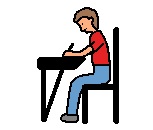 This month we turn our attention to writing. The Center for Literacy & Disability
Studies in North Carolina suggests that children should have the opportunity to
write for real purposes, everyday.
It is important for students who use AAC to experience writing
activities and have exposure to written text throughout the day. Here are some
ideas to help make this happen….
This month we turn our attention to writing. The Center for Literacy & Disability
Studies in North Carolina suggests that children should have the opportunity to
write for real purposes, everyday.
It is important for students who use AAC to experience writing
activities and have exposure to written text throughout the day. Here are some
ideas to help make this happen….Here are some phrase suggestions for writing a journal entry:
My journal for (date)
|
My favourite thing today was
|
Playing on the computer.
|
I had the best day ever.
|
I really didn’t like
|
Going outside.
|
Today was the worst!
|
Tomorrow I will be
|
Singing songs with my friends.
|
News report for (date)
|
I’m excited about
|
Writing my math test.
|
Creating Meaningful Opportunities for
Story Writing

Writing
Opportunities
 There are many
different ways that you can set up writing activities for children who use AAC
for their writing. An errorless writing
activity can be set up in some software such that the writer can select an
opening phrase/word from a pre-programmed set. This selection can then link to
a set of words/phrases that would all appropriately follow the first selection.
These activities are nice because they are low-risk and high success.
There are many
different ways that you can set up writing activities for children who use AAC
for their writing. An errorless writing
activity can be set up in some software such that the writer can select an
opening phrase/word from a pre-programmed set. This selection can then link to
a set of words/phrases that would all appropriately follow the first selection.
These activities are nice because they are low-risk and high success. No-Tech Ideas
 ·
Predictable chart writing is a 5-day process for a fun, easy, shared writing activity that
supports emergent and conventional writers and readers. The end result is a
book that has been written collaboratively by the students. For children who
use AAC, this process engages them in the writing process and supports them to
use the vocabulary on their communication system.
·
Predictable chart writing is a 5-day process for a fun, easy, shared writing activity that
supports emergent and conventional writers and readers. The end result is a
book that has been written collaboratively by the students. For children who
use AAC, this process engages them in the writing process and supports them to
use the vocabulary on their communication system. Light Tech Ideas
·
A student’s written piece (e.g.
story, poem) can be recorded into a single or sequential message device and
presented to classmates, friends or family.
High Tech Ideas
·
Many
high tech devices have writing capabilities built in (e.g. text entry, file
management, editing) and can send messages from the device to a computer.
Wait!
Don’t delete that!
For someone who is using an alternative access method to write on the computer,
the task can be a time consuming and effortful process. As facilitators, it is
often tempting to help a student by deleting what appears to be an obvious
mistake in their written work. However, deleting errors may take away the
learning opportunity that all writers need to develop their skills and achieve
success. Print the work, and use the errors as learning opportunities as
suggested by Gretchen Hanser, an expert in assistive and instructional
technologies.

No comments:
Post a Comment